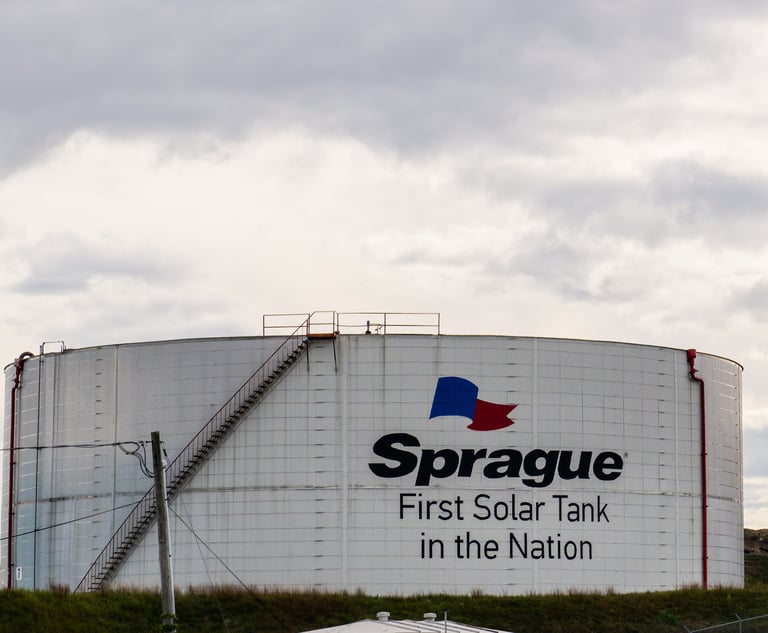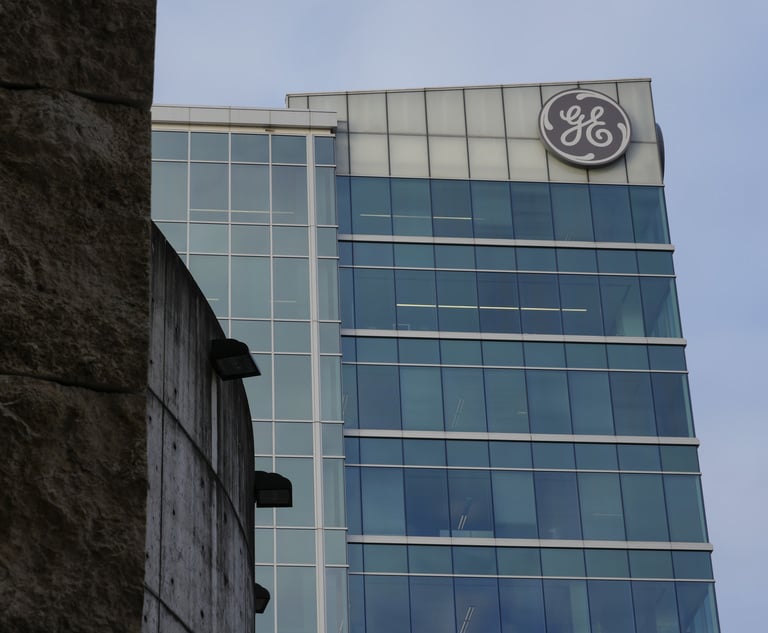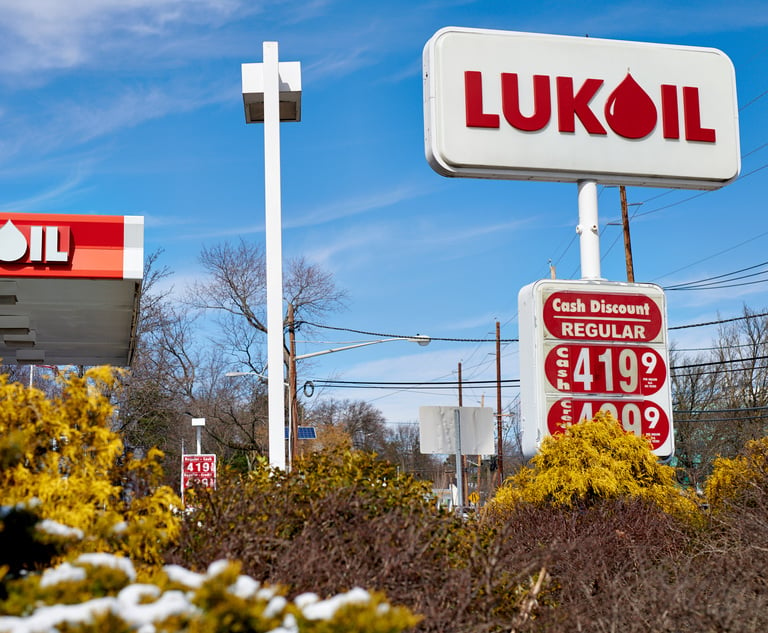Honeywell Sues to Claw Back Costs From Sunoco Over Onondaga Lake Cleanup
The complaint, filed in the Northern District of New York, adds to another lawsuit from Honeywell against ExxonMobil over similar claims that the company was also responsible for polluting the lake and should therefore have to share the cost of cleanup.
October 03, 2018 at 05:56 PM
4 minute read
 Photo: Shutterstock
Photo: Shutterstock
Technology company Honeywell is suing Sunoco in federal court to claw back some of the nearly $500 million the former was ordered to pay in cleaning up Onondaga Lake over more than two decades.
The complaint, filed in the U.S. District Court for the Northern District of New York, adds to another lawsuit from Honeywell against ExxonMobil over similar claims that the company was also responsible for polluting the lake and should therefore have to share the cost of cleanup.
A spokeswoman for Sunoco did not respond to a request for comment on Wednesday.
The claims alleged by Honeywell in the complaint date back almost a century to when Sunoco took ownership of a series of petroleum storage facilities in Syracuse in 1919. Sunoco owned and operated those facilities until 1993, according to the complaint.
Honeywell claimed that one of Sunoco's terminals was destroyed by “a massive explosion” in 1928, which allegedly resulted in an unknown amount of petroleum flowing into the Barge Canal on the northwest side of Syracuse. The canal connects to Onondaga Lake.
That was one of several occasions when Sunoco allegedly added to the lake's pollution, Honeywell said.
A pipeline owned by Sunoco on the southern shore of the lake leaked an indeterminate amount of gasoline in 1954, the complaint said. On another occasion about a decade later, the Syracuse Fire Department was sent to a terminal owned by Sunoco for an underground leak in the same pipeline.
The fire department was called to the terminal again in 1973 after a worker digging a new manhole for the sewer struck gas, oil and kerosene. The pipeline also leaked unknown amounts of fuel in the 1980s, with leaks also happening at the terminal, according to the complaint.
Honeywell also claimed in the lawsuit that Sunoco allowed a sludge generated at its terminals to drain into ditches or storm sewers, which discharged to waterways that led to Onondaga Lake. A barge stationed on the lake by Sunoco also leaked as much as 9,000 gallons of gasoline during one incident in 1939, according to Honeywell.
All of those events were accompanied by frequent spills and leaks at the terminals, which contaminated the soil in that area of the city, the complaint said.
Sunoco entered into a tolling agreement with Honeywell in 2009, but has since minimized its liability in polluting the lake, the complaint said. They tried to settle the claims, but so far have been unable to, Honeywell said.
Brian Israel, a partner at Arnold & Porter, represents Honeywell in both cases against Sunoco and ExxonMobil. He deferred comment to a Honeywell spokeswoman, who did not add anything beyond the complaint.
“Honeywell is seeking reimbursements from several companies that the company alleges released petroleum and hazardous substances into Onondaga Lake resulting in the contamination which has now been cleaned up,” the spokeswoman said. “These companies operated in Oil City, a former industrial area in the city of Syracuse, east of the lake.”
Honeywell is not seeking a specific amount from Sunoco in the lawsuit, only that the company “contribute their equitable share” of Honeywell's efforts to clean up Onondaga Lake, the complaint said. They also want Sunoco to be labeled as liable for their share of the pollution by the court.
Honeywell has, so far, paid close to $500 million toward the cleanup of the lake through a series of court orders. The company contributed to the contamination by leaking mercury and other hazardous chemicals into waterways and into the lake throughout the 1900s, according to the state Attorney General's Office and the U.S. Department of Justice.
The lawsuit could end quite unlike the explosion that spurred Sunoco's alleged contamination of Onondaga Lake. The legal action against ExxonMobil, filed earlier this year, was referred to mandatory mediation last month by U.S. Magistrate Judge David Peebles. That doesn't necessarily mean the case will be settled, but it gives the parties greater opportunity to come to an agreement.
READ MORE:
Researchers Aim to Unlock Data on Detained Immigrants as FOIA Lawsuit Advances
NRA Argues Discovery Could Show State Coerced Companies to Cut Ties
This content has been archived. It is available through our partners, LexisNexis® and Bloomberg Law.
To view this content, please continue to their sites.
Not a Lexis Subscriber?
Subscribe Now
Not a Bloomberg Law Subscriber?
Subscribe Now
NOT FOR REPRINT
© 2025 ALM Global, LLC, All Rights Reserved. Request academic re-use from www.copyright.com. All other uses, submit a request to [email protected]. For more information visit Asset & Logo Licensing.
You Might Like
View All
Oil Co. Alleges Plot to Drive Away Competition in NYC's Liquid Fuel Market
3 minute read

GE Agrees to $362.5M Deal to End Shareholder Claims Over Power, Insurance Risks
2 minute read
Lukoil Pan Americas Sues Investment Firm Over Alleged $18 Million Breach
Trending Stories
- 1New York-Based Skadden Team Joins White & Case Group in Mexico City for Citigroup Demerger
- 2No Two Wildfires Alike: Lawyers Take Different Legal Strategies in California
- 3Poop-Themed Dog Toy OK as Parody, but Still Tarnished Jack Daniel’s Brand, Court Says
- 4Meet the New President of NY's Association of Trial Court Jurists
- 5Lawyers' Phones Are Ringing: What Should Employers Do If ICE Raids Their Business?
Who Got The Work
J. Brugh Lower of Gibbons has entered an appearance for industrial equipment supplier Devco Corporation in a pending trademark infringement lawsuit. The suit, accusing the defendant of selling knock-off Graco products, was filed Dec. 18 in New Jersey District Court by Rivkin Radler on behalf of Graco Inc. and Graco Minnesota. The case, assigned to U.S. District Judge Zahid N. Quraishi, is 3:24-cv-11294, Graco Inc. et al v. Devco Corporation.
Who Got The Work
Rebecca Maller-Stein and Kent A. Yalowitz of Arnold & Porter Kaye Scholer have entered their appearances for Hanaco Venture Capital and its executives, Lior Prosor and David Frankel, in a pending securities lawsuit. The action, filed on Dec. 24 in New York Southern District Court by Zell, Aron & Co. on behalf of Goldeneye Advisors, accuses the defendants of negligently and fraudulently managing the plaintiff's $1 million investment. The case, assigned to U.S. District Judge Vernon S. Broderick, is 1:24-cv-09918, Goldeneye Advisors, LLC v. Hanaco Venture Capital, Ltd. et al.
Who Got The Work
Attorneys from A&O Shearman has stepped in as defense counsel for Toronto-Dominion Bank and other defendants in a pending securities class action. The suit, filed Dec. 11 in New York Southern District Court by Bleichmar Fonti & Auld, accuses the defendants of concealing the bank's 'pervasive' deficiencies in regards to its compliance with the Bank Secrecy Act and the quality of its anti-money laundering controls. The case, assigned to U.S. District Judge Arun Subramanian, is 1:24-cv-09445, Gonzalez v. The Toronto-Dominion Bank et al.
Who Got The Work
Crown Castle International, a Pennsylvania company providing shared communications infrastructure, has turned to Luke D. Wolf of Gordon Rees Scully Mansukhani to fend off a pending breach-of-contract lawsuit. The court action, filed Nov. 25 in Michigan Eastern District Court by Hooper Hathaway PC on behalf of The Town Residences LLC, accuses Crown Castle of failing to transfer approximately $30,000 in utility payments from T-Mobile in breach of a roof-top lease and assignment agreement. The case, assigned to U.S. District Judge Susan K. Declercq, is 2:24-cv-13131, The Town Residences LLC v. T-Mobile US, Inc. et al.
Who Got The Work
Wilfred P. Coronato and Daniel M. Schwartz of McCarter & English have stepped in as defense counsel to Electrolux Home Products Inc. in a pending product liability lawsuit. The court action, filed Nov. 26 in New York Eastern District Court by Poulos Lopiccolo PC and Nagel Rice LLP on behalf of David Stern, alleges that the defendant's refrigerators’ drawers and shelving repeatedly break and fall apart within months after purchase. The case, assigned to U.S. District Judge Joan M. Azrack, is 2:24-cv-08204, Stern v. Electrolux Home Products, Inc.
Featured Firms
Law Offices of Gary Martin Hays & Associates, P.C.
(470) 294-1674
Law Offices of Mark E. Salomone
(857) 444-6468
Smith & Hassler
(713) 739-1250






